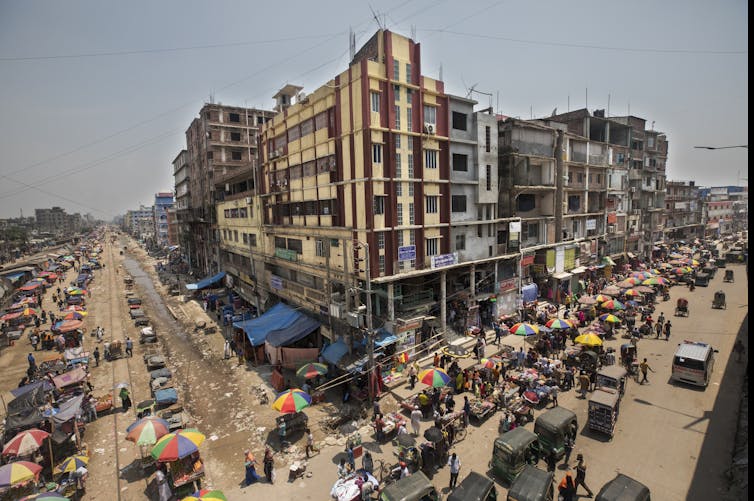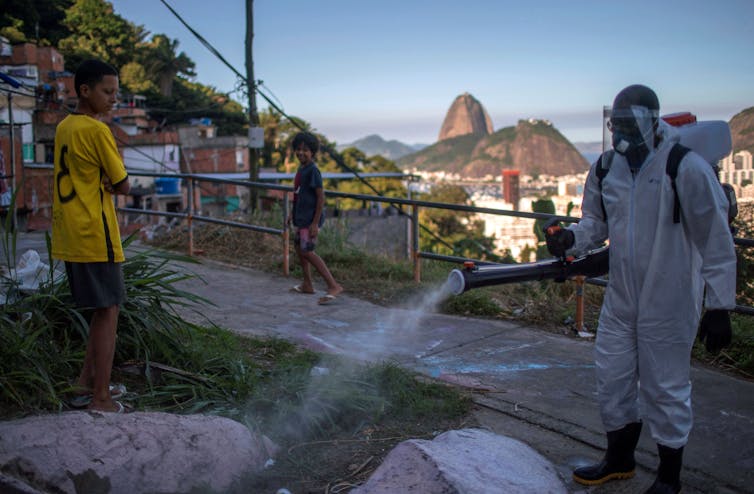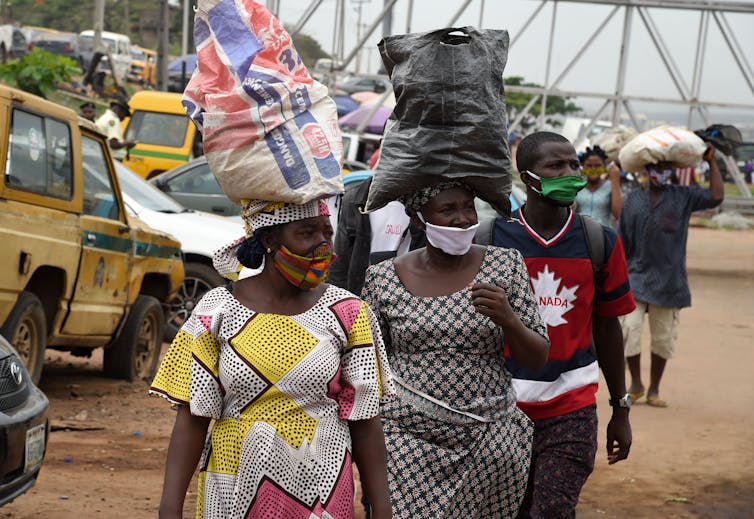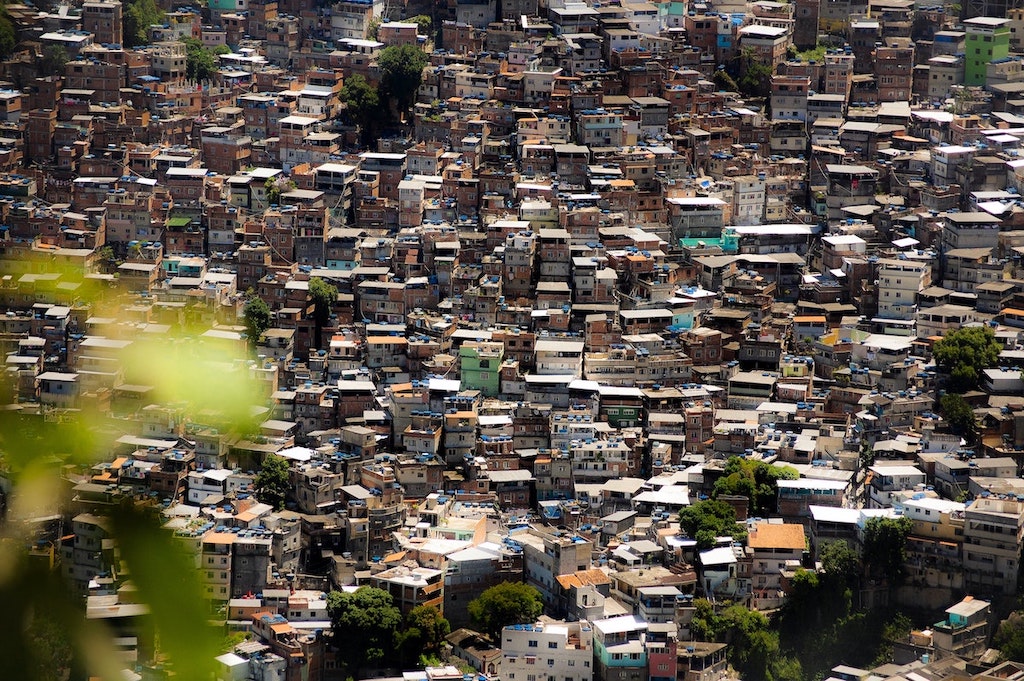Having ravaged some of the world’s wealthiest cities, the coronavirus pandemic is now spreading into the megacities of developing countries. Sprawling urban areas in Brazil, Nigeria and Bangladesh are all seeing COVID-19 infections rise rapidly.

We study the fragility and resilience of such cities and their urban peripheries, with the aim of encouraging data-driven policy decisions. Given its deadly trajectory in marginalized communities of hard-hit New York and London, coronavirus may well devastate much poorer cities.
Particularly concerning are the slum areas that are home to roughly a billion people – one in seven people on Earth. Characterized by insecure property rights, low-quality housing, limited basic services and poor sanitation, these informal settlements aggregate risk factors that accelerate the spread of infection.
Yet, our research finds, many residents of slums and squatter settlements are not getting the help they need to survive the coronavirus pandemic.
Density and poverty
Overcrowding is one reason slums are known incubators of disease. Informal settlements are typically 10 times denser than neighboring areas of the same city.
The Dharavi slum in central Mumbai, for example, has some 97,000 residents per square mile, compared to 11,500 people per square mile elsewhere in the city. It is far harder to practice physical distancing, at home or on the street, in such close quarters.
Most of the world’s poorest urban neighborhoods additionally lack clean potable water and a private bathroom, making lifesaving practices like hand-washing a challenge.
To get to work – a necessity for those with very low incomes and no savings – many people in slums travel jammed together in vans and buses over long distances that are perfect vectors for disease.
For several reasons – among them little access to health care – people living in informal settlements also suffer disproportionately from underlying health conditions such as obesity, diabetes and hypertension, according to a 2016 special edition of the Lancet on slums. All of these problems can exacerbate respiratory illnesses such as COVID-19.
Rio de Janeiro
In Brazil, which is fast becoming a global COVID-19 epicenter, at least 1.5 million of Rio de Janeiro’s 6.7 million residents live in the city’s 1,000 “favelas,” or slum settlements.
Many favela residents lack piped water or resources even to buy soap. But Brazil’s national government, which denies the severity of its outbreak, is offering very little pandemic aid. That’s left community organizations to deliver food and hygiene products to Rio’s poorest.
Hundreds of favela residents have already tested positive for COVID-19. But with 90% of intensive care beds occupied, those experiencing severe illness have little chance of getting proper emergency care.

The economic fallout of COVID-19 is also devastating for poorer people. In Rio’s favelas, where residents typically make less than US$5 a day, over 70% of households report an income decline since the coronavirus outbreak, according to a survey supported by the Locomotiva Institute and the Unified Center for Favelas.
Lagos and Dhaka
Fighting coronavirus is proving difficult in Lagos, the largest city in Nigeria and its COVID-19 epicenter. The city, Africa’s biggest, is home to an estimated 26 million people. Nearly three-quarters of them live in one of Lagos’s 100 slums.
A large proportion of those in slums subsist hand-to-mouth, working in the informal sector as street vendors, waste recyclers, artisans and the like. Such jobs offer no health insurance or pensions – no basic social safety net.
As in Rio, many informal workers in Lagos have been deprived of even this meager income during the capital’s intermittent coronavirus lockdowns. Staying home to survive a pandemic is only an option if you can afford it.

Similar crises are playing out in many poor megacities worldwide. In Bangladesh, for example, COVID-19 is spreading quickly through the capital of Dhaka, home to almost 9 million people, 40% of whom live in slums.
The Bangladeshi capital has about 80 public intensive care units, far fewer than required. Nationwide, just over 190 ICUs serve Bangladesh’s population of 161 million – 47 times less per capita than New York City after it surged its ICU capacity.
Lockdowns and curfews
Some developing countries acted early to prevent outbreaks and appear to have dodged the first wave of COVID-19. With memory of past pandemics fresh, governments, businesses and civil societies in Sierra Leone, Uganda and Vietnam conducted extensive testing and contact tracing and to bolster their primary health care systems, combined them with targeted education campaigns.
Yet, our research finds many governments are responding to coronavirus outbreaks in slums in one of two ways: with a heavy fist or with neglect.
In city after city, we see strict lockdowns imposed on poor populations without regard to the factors that could impede compliance. Where food handouts are provided, supplies are generally insufficient.
People who violate quarantine – by trying to work, say – risk police violence. Conflicts have erupted over curfew enforcement in cities across Kenya, India and South Africa.
Such tactics risk undermining residents’ already low faith in government, just when public trust is most needed to ensure compliance with health guidance.
State neglect also allows the criminal groups to consolidate their influence in slum areas. From Brazil to Mexico, cartels, gangs and organized crime are handing out food and medical supplies, deepening their grip on power.
A better way
A new Journal of Urban Health study recommends that developing countries facing infectious disease outbreaks prioritize getting water, food and sanitation materials to their poorest residents.
Development economists also advise making cash payments to the poorest households and halting evictions, both measures taken to ease the coronavirus crisis in advanced countries.
To work in areas where trust in government is low, all these measures must be underpinned by a strong communications program involving credible neighborhood leaders, radio, social media, TV ads and phone messages. Groups like UN-Habitat and Slum Dwellers International are working with local organizations in slum communities to reach people in places where assistance is most needed.
Global pandemics require global responses. But places like Rio, Lagos and Dhaka face different challenges in the coronavirus fight than, say, New York City.
The public health response must look different, too.
![]()
Robert Muggah, Lecturer, Pontifical Catholic University of Rio de Janeiro (PUC-Rio) and Richard Florida, Professor, University of Toronto
This article is republished from The Conversation under a Creative Commons license. Read the original article.










